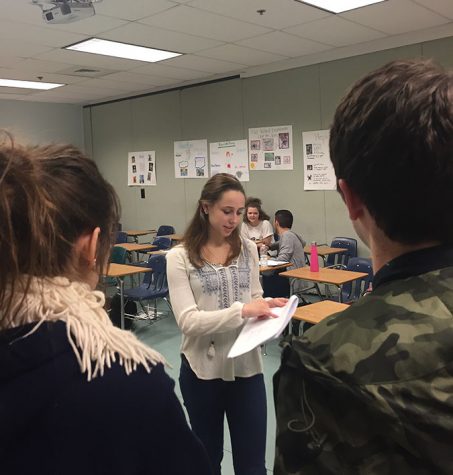How It’s Done: The One-Act Festival
February 6, 2017
This week the stage will be set with countless chairs, couches, and tables. Costumes will carefully be taken off their racks. People will scour the school for mirror space. The actors will prep backstage by reciting lines or performing pre-show rituals. Then, when all is set, the annual One-Act Festival will begin. The festival, which came about six years ago, has left its mark on Forge’s stage with countless shows written and directed solely by students.
The process of the One-Acts Festival begins in the drama classes of the students in the advanced third and fourth level.The students learn about one-act play writing through various lessons in class, and then they put their learning into play by coming up with a one-act play and writing one. Ms. Deborah Hansen, one of the drama teachers here at Forge, then critiques their first ten pages and helps the students find where they want their story to go from there. Then, after the students turn in their final drafts, the drama teachers, Ms. Hansen and Mr. Marcus Salley, select four plays to produce in the festival.
“Sometimes we have plays that are just as good as those chosen but since we’re trying to make something that’s appealing to a lot of people, we might not put all four dramas in the festival. We’ll choose something that makes a good evening of entertainment,” Hansen said.
After the plays are chosen, the students who express interesting in directing one of the plays get to read all four scripts and fill out an application on why they wish to direct one of the plays. They also have to discuss what ideas they have for it staging wise.

Once the directors are chosen, the casting process begins. Auditions are held and the playwright and the directors sit through the auditions and choose their cast. With the casts chosen, rehearsals begin and the shows are brought to life.
With the stories currently being written, Hansen has gotten a first hand look at what is coming to Forge’s stage soon.
“I think this year has been one of the top years for creative ideas,” Hansen said.
With this being the sixth year of doing this festival, the students are being able to think ahead of time what they wish for their show.
“I think that that forethought is enabling kids to come up with more creative ideas and they are also thinking more how it will translate to the stage,” Hansen said. “You might have an idea, and it may be a great idea, but we are starting to get better at thinking about how that might look on stage whereas usually we think about it as it is almost a movie. I think the kids are getting better at understanding that this [school] is where it is going to be so [they think] ‘this is the ramifications and I have to tailor my story towards the stage presentation’.”
With all this forethought going into the plays, Hansen has high hopes for the festival this year.
“I assume [this festival] will be the best one yet, because they keep getting better and better. The more the kids are learning, thinking, and knowing about how to do it, the better the stuff gets,” Hansen said.
The theater students in general continue to thrive, but, especially with the one-acts coming up, they kick into high gear and take it all very seriously.
“For the most part, my kids are very invested so they are always eager to do their best work, but there’s something about knowing that your friend or your peer wrote that piece,” Hansen said. “And it’s your job to figure out as a director how to translate that to the stage in a way that is going to make people think, laugh, or cry. I think it’s very monumental for most students to be a part of that.”
As the years pass by with shows, Hansen enjoys being able to see her students work so hard and pull off something as spectacular as the One-Act Festival.

